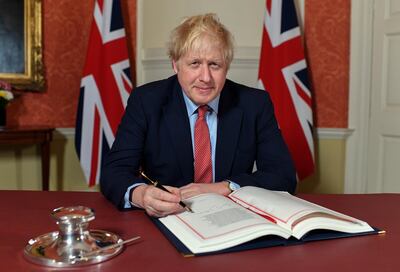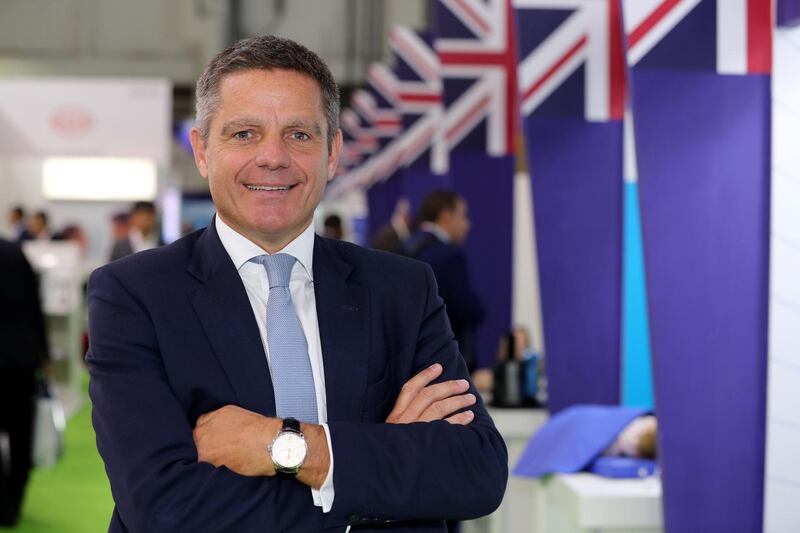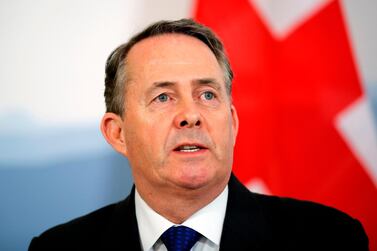A British envoy in the Gulf has downplayed the prospect of a quick free trade deal being struck in the region after the UK leaves the European Union this week.
Simon Penney, the country's trade commissioner for the Middle East, said the UK is set to prioritise agreements with the likes of the United States once it leaves the world’s largest trading bloc, mainly because British businesses already find it relatively easy to do business in the GCC due to low tariffs.
The UK is to officially leave the EU in the early hours of Saturday, UAE time. It will then be free to negotiate and sign new trade deals with countries with no existing EU trade agreements.
The ability to strike its own trade deals, something the UK could not do within the EU, was put forward as a major advantage of Brexit by those who argued in favour of the historic rupture with Brussels.
While Sultan Al Mansouri, the UAE economy minister, has previously revealed that the UK had made an approach about a trade deal, Mr Penney does not envisage a swift agreement.
“There’s so much you can do without a free trade agreement,” he said. “That’s not to say in the future we won’t be looking to do one, we will be of course, but it’s not the same priority and imperative it is elsewhere.
“We’ve been very clear that the US is one of our priorities.
"The barriers to trade here are very low.
“So you won’t hear businesses demand a free trade agreement in the way you might in other markets, quite simply because doing business is already pretty easy.
“Ultimately we’ve got finite human resources to strike these deals so logic dictates that you’ll do it where the barriers are the greatest and the benefit is the highest by removing the barriers.
“The ambition, of course going forward, is to put in place free trade agreements with all our major trading partners. When you take the GCC as a trading bloc, outside of the European Union, the GCC is the UK’s second-largest export market behind the US.”
He said that the UK would look to strike a single trade deal with the GCC, rather than looking at individual deals with different countries in the Gulf, but that it was “very difficult to put a time frame” on when one might be sealed.

Speaking at the Arab Health conference in Dubai, he said more UK businesses had begun looking beyond Europe to export their products. A major UK delegation is at the event, with more than 200 exhibitors.
Among them are a company that has developed a virtual reality training tool for medical students, allowing them to carry out simulated operations, and firms that specialise in the analysis of medical data using artificial intelligence.
Cutting-edge UK products aimed at helping people with autism, diabetes, skin cancer and obesity in particular could prove helpful in the UAE market, Mr Penney, a former banker, said. Medicines and pharmaceutical products represent the second largest export market from the UK, after cars.
He admitted that the drawn-out Brexit process had caused “uncertainty” for Gulf investors looking at putting money into the UK. However, he said this had largely been resolved by Boris Johnson’s resounding victory in December’s election which provided clarity over the country’s short-term future.
About 5,000 UK companies already do business in the UAE, Mr Penney said, with many increasingly looking at expanding into Saudi Arabia as it opens up its economy.
“It’s creating a lot of excitement,” he said, of recent developments in the Kingdom. “When we have trade missions into Saudi across all sectors, our biggest challenge is limiting the numbers and selecting companies rather than encouraging them.
“It’s fair to say a lot of those companies will still be using the UAE as their base, but it’s only a matter of time, as Saudi continues on its current trajectory of transformation, you’ll see more and more people relocating to Saudi and more and more businesses establish themselves in Saudi.”






